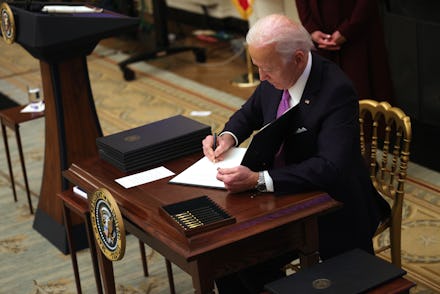President Biden just signed an executive order to phase out private federal prisons

On Tuesday, President Biden signed an executive order that directs the Department of Justice to end federal use of private prisons. "To decrease incarceration levels, we must reduce profit-based incentives to incarcerate by phasing out the federal government’s reliance on privately operated criminal detention facilities," the executive order reads. "Incarcerated individuals should be given a fair chance to fully reintegrate into their communities, including by participating in programming tailored to earning a good living, securing affordable housing, and participating in our democracy as our fellow citizens."
The executive order doesn't specify a timeline for the phase-out. The federal government enters contracts with private corporations, so this will likely be a process of letting those contracts expire. Even still, the move comes after a year of reckoning with systemic racism in the U.S. and highlights a potential legislative goal that aligns with what progressive Democrats want to see. The justification offered in Biden's executive order for ending the partnership between the federal government and private prison operators — inefficacy of incarceration, racism embedded in prisons, and sheer cost — mirrors what people who have lived in prisons and other anti-incarceration activists have said for decades. It also reflects the belief that nobody should be profiting off the U.S. criminal justice system, as Biden himself said.
"For the loved ones and families and entire communities of every one of those people, this may be a significant change," Emily Galvin-Almanza, the cofounder and executive director of Partners for Justice, a nonprofit that aims to break the cycle of poverty and incarceration, tells Mic. Galvin-Almanza notes that the number of people who will be impacted by this executive order is around 14,000, which is a small percentage of the 2 million people currently incarcerated in the U.S. However, she says the executive order is an important step toward advancing other legislative measures that address racism in our systems of education, housing, and employment, all of which are inextricably tied to incarceration.
According to the executive order, racial justice is central to the Biden administration's motivation. "More than 2 million people are currently incarcerated in the United States, including a disproportionate number of people of color," the executive order states. "There is broad consensus that our current system of mass incarceration imposes significant costs and hardships on our society and communities and does not make us safer."
The executive order is correct: At its core, incarceration is a racial and economic justice issue, especially when we consider all the ways incarceration is used as a punishment for poverty, and how having been incarcerated can be a hurdle toward achieving economic stability. "When you think about a system that profits off the bodies of and control of Black and brown people, one cannot help but think of this country's history with slavery," Galvin-Almanza tells Mic.
While serving as a senator for Delaware, Biden championed the 1994 crime bill, which contributed to the federal government's expanded use of private prisons. The bill created $96.5 million for new federal prisons, instituted mandatory minimum sentences, and reduced opportunities for early release, keeping people incarcerated for longer periods of time. Galvin-Almanza didn't say this executive order is Biden's explicit response to the 1994 federal legislation, but she did tell Mic that it signals to her that the president "is learning to listen to impacted people instead of systems of governance or confinement, [and] learning to listen to Black people and brown people about what they're experiencing instead of relying on what seemed to be an innate trust of law enforcement."
She adds: "I hope we're going to see a lot more from him."